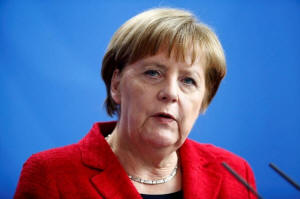|
Merkel sees no end to EU sanctions
against Russia
 Send a link to a friend
Send a link to a friend
 [August 19, 2016]
BERLIN (Reuters) - There is no
reason to lift the European Union's sanctions against Russia as Moscow
has not fulfilled all of its commitments under an international peace
plan, German Chancellor Angela Merkel said in an interview published on
Friday. [August 19, 2016]
BERLIN (Reuters) - There is no
reason to lift the European Union's sanctions against Russia as Moscow
has not fulfilled all of its commitments under an international peace
plan, German Chancellor Angela Merkel said in an interview published on
Friday.
Merkel told the RedaktionsNetzwerks Deutschland (RND) that Russia had
caused a major crisis by annexing the Black Sea peninsula of Crimea in
2014 and with its support for separatists in eastern Ukraine.
"Europe had to react against this violation of basic principles," Merkel
said.
She added that she and French President Francois Hollande were working
"with all one's strength" to urge Ukraine and Russia to implement the
so-called Minsk ceasefire agreement despite all the difficulties.
"This is and remains the yardstick for the future of the sanctions,"
Merkel said.
Russia has been under U.S. and EU sanctions over its annexation of
Crimea and support for separatists in eastern Ukraine for two years.
With fighting occasionally flaring and both sides blaming each other for
failing to implement truce terms, the Minsk peace deal looks moribund.

The EU agreed in June to extend energy, financial and defense sanctions
on Russia over the conflict in Ukraine until the end of January next
year.
German Foreign Minister Frank-Walter Steinmeier and other leading Social
Democrats, the junior partner in Merkel's ruling coalition, have struck
a more conciliatory tone in the past months, saying the EU should
gradually phase out sanctions if there was partial progress in the peace
process.
[to top of second column] |

German Chancellor Angela Merkel attends a news conference after
talks with Armenia's President Serzh Sargsyan at the Chancellery in
Berlin, Germany, April 6, 2016. REUTERS/Hannibal Hanschke/File Photo

But even Steinmeier has said that Russia and Ukraine have hardly made
any progress in recent talks to implement the peace plan.
"There are no improvements, especially when it comes to security,"
Foreign Ministry spokeswoman Sawsan Chebli said, adding the
negotiations had reached deadlock also in other areas such as
political reforms and local elections.
"Still despite the difficult situation and repeated setbacks we
think it's important that we keep on trying and do everything we can
to make the Minsk peace plan a success," Chebli said.
(Reporting by Caroline Copley and Michael Nienaber; Editing by
Dominic Evans)
[© 2016 Thomson Reuters. All rights
reserved.]
Copyright 2016 Reuters. All rights reserved. This material may not be published,
broadcast, rewritten or redistributed.
 |